Foods for Breast Cancer Prevention
September 24, 2024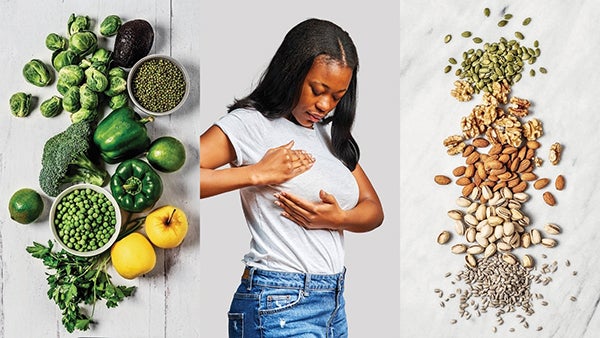
By: WakeMed Health & Hospitals
Categories: diet & nutrition, Cancer Care
Medically Reviewed by Rebecca Simpson, MS, RD, LDN
According to the American Cancer Society, "About 13 percent of women will develop breast cancer. This means there is a one in eight chance."
Of those who will experience breast cancer, about five to 10 percent of cases are thought to be hereditary, resulting directly from gene changes passed on from a parent.
With breast cancer concerns weighing on the minds of many women, and the reality that many of these cancers are lifestyle related, we sat down with Rebecca Simpson, MS, RD, LDN, an outpatient dietitian at WakeMed Cancer Care, to learn more about how our diet and lifestyle can play a role in preventing or lowering our risk of developing breast cancer.
Foods that May Lower Breast Cancer Risks
There are many factors associated with breast cancer development, and improving your diet is one of them. Eating a plant-based diet is ideal in the fight against cancer since it is nutrient-rich and helps maintain a healthy weight. A good example of that is the Mediterranean diet. Here are eight foods that may help reduce your risk of breast cancer and a few to avoid.
1. Whole grains
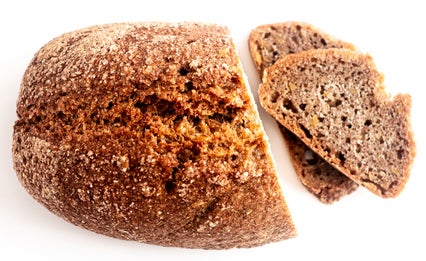 One of the most significant health benefits of whole grains is their high dietary fiber content. Research from the National Institutes of Health has shown that a high-fiber diet is associated with a lower risk of breast cancer. Fiber helps regulate hormones by promoting healthy insulin levels and estrogen metabolism, both of which are crucial for reducing breast cancer risks. Additionally, fiber aids in digestion and promotes a feeling of fullness, which can help maintain a healthy weight — another critical factor in breast cancer prevention.
One of the most significant health benefits of whole grains is their high dietary fiber content. Research from the National Institutes of Health has shown that a high-fiber diet is associated with a lower risk of breast cancer. Fiber helps regulate hormones by promoting healthy insulin levels and estrogen metabolism, both of which are crucial for reducing breast cancer risks. Additionally, fiber aids in digestion and promotes a feeling of fullness, which can help maintain a healthy weight — another critical factor in breast cancer prevention.
Whole grains are rich in antioxidants, including phenolic acids and flavonoids, which have anti-inflammatory and anti-cancer properties. These compounds help combat oxidative stress in the body, reducing the risk of cellular damage that can lead to cancer. Antioxidants can help protect cells from DNA damage, a precursor to cancer development.
Whole grains are excellent sources of essential vitamins and minerals, such as B vitamins, iron, magnesium and selenium. B vitamins, including folate, are vital for DNA synthesis and repair, and adequate levels of folate have been associated with a reduced risk of breast cancer. Magnesium and selenium play roles in antioxidant defense mechanisms and the regulation of cellular processes, further supporting the body's fight against cancer.
Whole grains generally have a lower glycemic index (GI) compared to refined grains, which means they cause a slower, more gradual increase in blood sugar levels. This characteristic is important for maintaining healthy insulin levels, as elevated insulin can promote the growth of breast cancer.
A notable study published in the journal Cancer Epidemiology, Biomarkers & Prevention found that women with higher whole grain intake had a significantly reduced risk of developing breast cancer compared to those who consumed fewer whole grains. Another analysis by the American Cancer Society revealed that women consuming three or more servings of whole grains per day had a lower risk of breast cancer compared to those who consumed one serving or less.
2. Vegetables
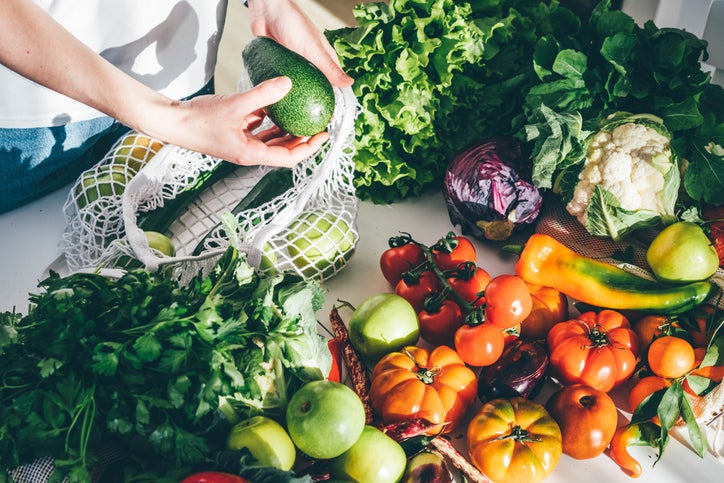
Vegetables are rich sources of essential vitamins, minerals, fiber and phytonutrients, all of which contribute to overall health and well-being.
Many vegetables are packed with antioxidants, vitamins A, C and E.
Vegetables contain various phytochemicals, such as flavonoids, carotenoids and glucosinolates that have anti-cancer properties. These compounds can inhibit the growth of cancer cells and promote the self-destruction of abnormal cells.
A diet high in fiber, which is abundant in vegetables. As previously mentioned, fiber helps regulate estrogen levels in the body, and high estrogen levels have been linked to breast cancer. Additionally, fiber aids in digestion and helps maintain a healthy weight.
Chronic inflammation in the body is a risk factor for many diseases, including cancer. Many vegetables, especially cruciferous ones, such as broccoli, cauliflower and brussels sprouts, contain anti-inflammatory properties that can help reduce this risk.
3. Fruits
Protecting cells from damage — berries, citrus fruits and pomegranates are packed with antioxidants. These compounds, including vitamin C and polyphenols, help combat oxidative stress by neutralizing free radicals that can damage DNA and may contribute to cancer development.
Fruits, such as apples, pears and bananas are excellent sources of dietary fiber.
Phytochemicals are a natural defense against cancer. Many fruits contain anti-cancer phytochemicals. For instance, the carotenoids found in oranges, papayas and mangoes not only boost immune function but may also play a role in inhibiting the growth of cancer cells. Similarly, the anthocyanins present in dark berries have anti-inflammatory effects that could further contribute to cancer prevention.
Folates in avocados, oranges, bananas and more are not only delicious but also rich in folate. Folate has been linked to DNA synthesis and repair, which is crucial in preventing mutations that can lead to cancer. A sufficient intake of folate is particularly important for women, as it supports overall reproductive health and may reduce the risk of breast cancer.
4. Beans
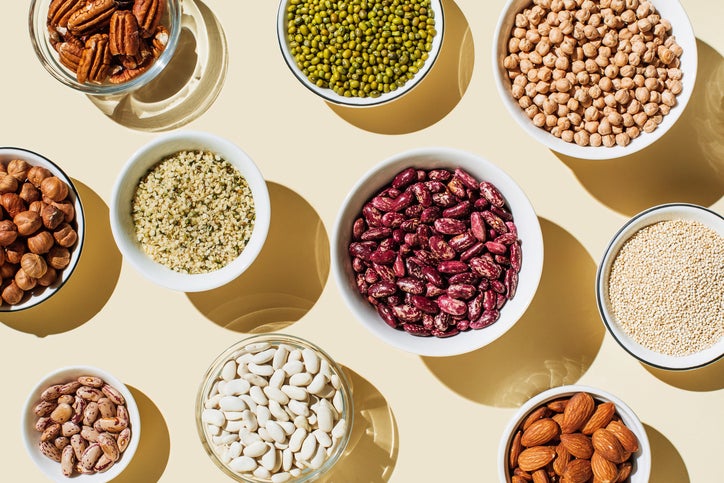
One of the standout features of beans is their high fiber content. Fiber helps reduce cancer risks by promoting healthy gut microbiota, enhancing the production of beneficial short-chain fatty acids and creating an environment in which harmful substances are less likely to cause damage to cells.
Fiber helps to regulate blood sugar levels and cholesterol, further contributing to a reduced risk of cancers. Beans, rich in fiber, are typically low in calories and high in satiety, which can also aid in weight management.
Beans are nutritional powerhouses, packed with essential vitamins and minerals. They are excellent sources of B vitamins, particularly folate, which is important for DNA synthesis and repair. Beans are also rich in iron, potassium and magnesium, all of which contribute to overall health and help reduce the risk of cancer.
Flavonoids and phenolic acids play a vital role in neutralizing free radicals that can damage cells and lead to cancer. These compounds not only protect cells but also help in reducing inflammation, another critical factor in cancer development.
Beans are teeming with phytochemicals — the hidden horses in the fight against cancer. These naturally occurring compounds help to balance hormones in the body and have been associated with a lower risk of hormone-related cancers, such as breast and prostate cancer.
Saponins, another class of phytochemicals found in beans, have shown promise in laboratory studies for their ability to inhibit tumor growth and promote apoptosis (the process of programmed cell death that is often dysfunctional in cancer cells).
Additionally, beans contain lectins, which have antimicrobial properties and help in reducing the risk of cancer.
5. Olive Oil and Other Healthy Fats
Olive oil is rich in antioxidants, particularly vitamin E and polyphenols. These compounds combat oxidative stress.
The phenolic compounds in olive oil exhibit strong anti-inflammatory properties, helping to reduce markers of inflammation in the body. Regular consumption of olive oil may help lower the risk of inflammation-related cancers, such as those of the colon, breast, and prostate.
A diet rich in healthy fats, particularly olive oil, has been shown to support cardiovascular health. A healthy heart and circulation promote better blood flow and reduce the risk of metabolic diseases, which can influence cancer risks. Moreover, a balanced cardiovascular system is vital for overall wellness, which is crucial in cancer prevention strategies.
Many cancers are influenced by hormonal levels, particularly breast and prostate cancer. The monounsaturated fats found in olive oil can help maintain healthy hormone levels. A diet rich in olive oil may counteract the effects of estrogen, a hormone linked to hormonal cancers.
6. Fish
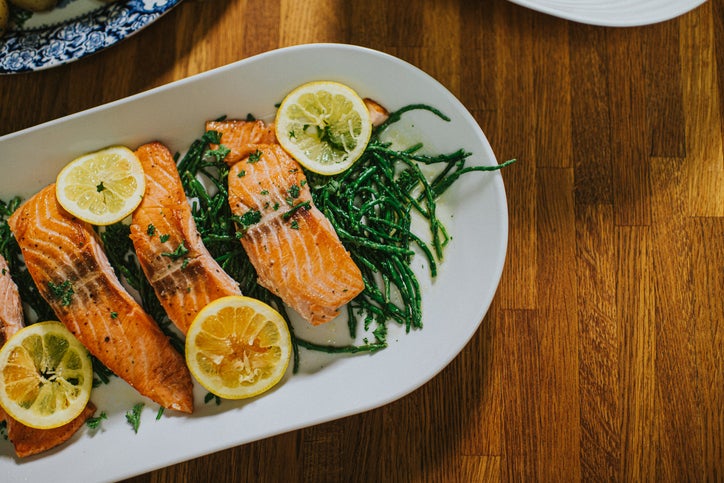
Omega-3 fatty acids possess powerful anti-inflammatory properties, which can inhibit the growth of cancer cells. In reducing inflammation in the body, omega-3s may lower cancer risks.
Omega-3s can influence gene expression, promoting the activity of anti-cancer genes while inhibiting pro-cancer genes. This modulation can decrease tumor growth and enhance the process of programmed cell death: a mechanism that helps the body eliminate malignant cells.
In addition to omega-3 fatty acids, fish is a good source of several vitamins and minerals, including vitamin D — which has been associated with cancer prevention. Known for its role in bone health, vitamin D also plays a role in cellular growth regulation and immune function. Regular consumption of fatty fish, such as salmon, mackerel and sardines can help boost vitamin D levels.
Found in high concentrations in fish, selenium is an essential mineral that helps the body produce antioxidant enzymes. These enzymes combat oxidative stress and may reduce DNA damage, which is a significant risk factor for cancer development.
7. Nuts and Seeds
Nuts and seeds are packed with antioxidant compounds.
Many nuts and seeds contain anti-inflammatory compounds that can help reduce inflammation in the body. For example, the omega-3 fatty acids in walnuts and flaxseeds can inhibit inflammatory pathways and help lower cancer risks.
Nuts and seeds are also good sources of dietary fiber.
Certain nuts and seeds, particularly flaxseeds, contain lignans and phytoestrogens that can help balance hormone levels. These compounds may reduce the risk of hormone-related cancers, such as breast and prostate cancer.
Incorporating nuts and seeds into your diet can promote satiety and help with weight management due to their high protein and fat content. Despite their calorie density, moderate nut consumption is associated with a lower BMI.
8. Calcium-rich Foods
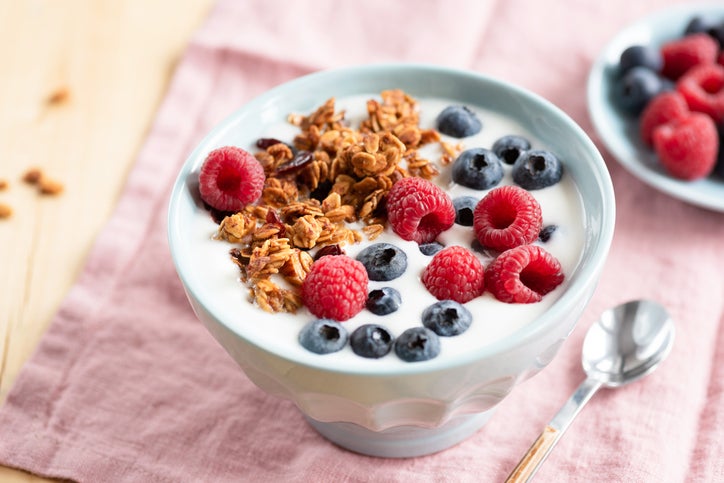
Calcium may help regulate estrogen levels in the body. Since estrogen is a hormone linked to breast cancer development, maintaining balanced estrogen levels could potentially lower risks.
Calcium plays a role in cell signaling pathways that regulate cell growth. Calcium could help promote healthy cell cycles and reduce the risk of malignancy.
Calcium is consumed with vitamin D, a nutrient that has been independently linked to lower breast cancer risks. The two nutrients may work together, enhancing calcium’s protective effects.
Foods to Limit in the Fight Against Breast Cancer
Certain foods have been shown to increase incidents of breast cancer. While it is ideal to refrain from these foods all together, moderation is key. Think of them as special occasion foods as opposed to foods eaten daily or weekly as part of a regular diet.
Here are foods to eat in very low moderation or avoid altogether:
- Limit red and processed meats as much as possible. Animal protein should make up no more than about 1/3 of a person's plate — mainly coming from lean poultry and fish.
- Limit excess, added sugars. Consuming added sugar can mean more calories, which can lead to weight gain. Naturally occurring sugars in fruits are fine. Added sugars in soft drinks, desserts and more should be limited or consumed in moderation.
- Processed foods that are high in added fat, sugar and sodium should also be limited. Take the time to read food labels to check for these additions.
Lifestyle Patterns that Impact the Risk for Developing Breast Cancer
While cancer can't be completely prevented, there are lifestyle factors that can increase the risk. They include the following:
- Consuming alcohol, including beer, wine and liquor
- Being overweight or obese, with a body mass index (BMI) rated at 25 or higher
- Being physically inactive
To decrease risks, women should adopt the following behaviors:
- Refrain from drinking alcohol, if possible. Otherwise, women should consume no more than one alcoholic beverage per day. This amounts to 1.5 ounces of liquor, five ounces of wine or 12 ounces of beer.
- Work toward losing weight and then maintaining it at a normal BMI rated between 18.5 and 24.9.
According to the Susan G. Komen Foundation, "Women who are overweight or obese after menopause have a 20 to 60 percent higher breast cancer risk than those who are lean."
- Exercise at least 30 minutes daily. Whether it is strength training, balance or cardio exercise is not as important as simply being active each day since exercise reduces cancer risks.
- Never start smoking, and if you do — quit. This means all types of tobacco products, including cigarettes, cigars, pipes and e-cigarettes. WakeMed's smoking cessation program "Quit With WakeMed" has seen great success in helping people quit smoking for good.
What to Remember
In daily life, simply remember to focus on what you need more of as opposed to what to cut out or reduce. This positive outlook helps eliminate undesirable behaviors. And, don’t forget that annual physicals and breast cancer screenings are key for early detection and diagnosis.
Need more guidance and support? Our team of dietitians in WakeMed Nutrition Services are happy to help. Whether you are leaving the hospital or being referred by your primary care physician or other provider, you may benefit from working with a registered dietitian (RD). Our goal is to help you focus on behavioral and lifestyle changes designed to prevent and treat disease and achieve optimal long-term health.
About Rebecca Simpson, MS, RD, LDN
 Rebecca Simpson, MS, RD, LDN, is a dietitian with clinical interests in oncology, type 2 diabetes and lipid disorders. She earned her bachelor's degree from Western Carolina University in Cullowhee, NC. She then completed a master's at Meredith College in Raleigh, NC. Simpson is certified by the Commission on Dietetic Registration.
Rebecca Simpson, MS, RD, LDN, is a dietitian with clinical interests in oncology, type 2 diabetes and lipid disorders. She earned her bachelor's degree from Western Carolina University in Cullowhee, NC. She then completed a master's at Meredith College in Raleigh, NC. Simpson is certified by the Commission on Dietetic Registration.
Simpson collaborates with patients to come up with realistic changes they can make to improve their health.
When not at work, Simpson enjoys spending time with her husband and two daughters — camping, hiking and swimming.